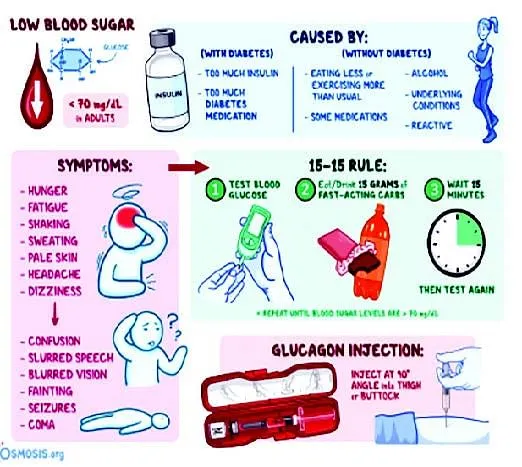What is Hypoglycemia?
Hypoglycemia is a condition in the elderly in which your blood sugar (glucose) level is lower than the standard range. Hypoglycemia is often related to diabetes treatment.
When do we say it is hypoglycemia?
Hypoglycemia is recognized with a decrease in blood glucose below 70 mg/dl.
Who is more prone to hypoglycemia?
Hypoglycemia is one of the most common acute complications of the treatment of diabetes in the elderly. Hypoglycemia can be a side effect of diabetes treatment. However, other drugs and a variety of conditions can also cause low blood sugar in people who don’t have diabetes.
Older age can increase the risk of developing hypoglycemia because of the higher rate of comorbidities such as renal failure, malnutrition, malignant diseases, and dementia.
Forgetting and taking a double dose of diabetes medicines is very common in the elderly.
What are the symptoms of hypoglycemia?
The symptoms of hypoglycemia depend not only on current blood glucose levels but also include the rate of decrease of blood glucose, age of the patient, concomitant complications, previous episodes of severe hypoglycemia and the type of medication. Initial symptoms include:
= Looking pale
= Shakiness
= Sweating
= Headache
= Hunger or nausea
= An irregular or fast heartbeat
= Fatigue
= Irritability or anxiety
= Difficulty concentrating
= Dizziness or lightheadedness
= Tingling or numbness of the lips, tongue or cheek
As hypoglycemia worsens, signs and symptoms can include:
= Anxiety, confusion
= Blurred vision
= Loss of coordination
= Slurred speech
= Nightmares, if asleep
Blood glucose levels below 45 mg/dl may cause profound disturbances in consciousness and generalized convulsions.
What is the impact of hypoglycemia on the elderly?
Recurrent severe hypoglycemia may lead to the development of brain degeneration with mood disorders and problems in concentrating in the elderly. Hypoglycemia also has a negative impact on the heart and may exacerbate myocardial ischemia. Hypoglycemia can lead to injuries, falls with fractures, and traffic accidents. Severe hypoglycemia is a complication with psychological and social consequences for the patients and their families
What are the causes of hypoglycemia in the elderly without diabetes?
Hypoglycemia in people without diabetes is much less common. Causes can include, taking someone else’s oral diabetes medication accidentally, Excessive alcohol drinking, Some illnesses like hepatitis or cirrhosis, severe infection, kidney disease, advanced heart disease, malnutrition and starvation when you don’t get enough food.
What is hypoglycemia unawareness?
Repeated episodes of hypoglycemia can lead to hypoglycemia unawareness. The body and brain no longer produce signs and symptoms that warn of low blood sugar, such as shakiness or irregular heartbeats (palpitations). When this happens, the risk of severe, life-threatening hypoglycemia increases. If you are taking diabetes medicines and have recurring episodes of hypoglycemia and hypoglycemia unawareness, your doctor might modify your treatment and ask for continuous glucose monitoring at home.
What is undertreated diabetes?
Fear of hypoglycemia can cause you to take fewer medicines or insulin to ensure that your blood sugar level doesn’t go too low. This can lead to uncontrolled diabetes. Talk to your doctor about your fear, and don’t change your diabetes medication dose without discussing changes with your doctor.
How can I prevent hypoglycemia?
Continuously monitor your glucose. Follow the diabetes management plan you and your doctor have advised. If you’re taking new medications, changing your eating or medication schedules, or adding new exercise, talk to your doctor about how these changes might affect your diabetes management and your risk of low blood sugar.
Learn about the signs and symptoms you experience with low blood sugar. This can help you identify and treat hypoglycemia before it gets too low.
Always have fast-acting sugar with you, such as juice, hard candy or glucose tablets so that you can treat a falling blood sugar level before it dips dangerously low.
When should I see a doctor?
When you have recurrent hypoglycemia and you don’t have diabetes.
When you have diabetes and hypoglycemia isn’t responding to treatment, such as drinking juice, eating candy, or taking glucose tablets.
Seek emergency help for someone with diabetes or a history of hypoglycemia who has symptoms of severe hypoglycemia or loses consciousness.







